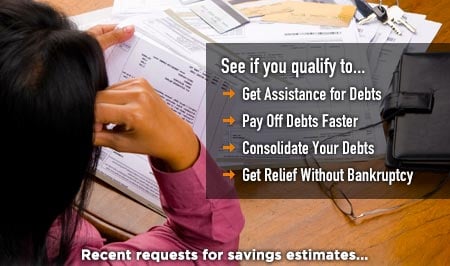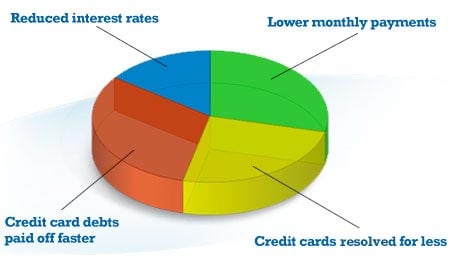
Will Debt Relief Help You Get Rid of Debt or Pay Off Debt Faster? Find Out with Your Free Debt Relief Analysis
Pay Off Debt Help
If your credit card debt has spiraled out of control and you are struggling to lower your debt, reduce, or pay off debts much faster, you might be interested in finding out how much you could potentially save through debt consolidation - also known as a debt management plan (DMP). Typically facilitated by credit counseling agencies, debt consolidation can provide many consumers in Florida and across the country with relief from their high-interest credit card debts, as well as unsecured debts (like medical bills, utilities, student loans, or department store charges).
When you consolidate your credit card and unsecured debts, the goal is to, ideally, direct more of your payment into paying the principal of your debts versus just the interest, and ultimately, reduce your debts at an accelerated pace. This goal is achieved by coordinating one consolidated payment to a credit counseling agency which in turn, distributes those funds to your individual creditors who have agreed to offer the benefits of debt relief and have been added to the debt management plan. Consolidating debts into a single, more structured, and more manageable monthly payment can typically allow you to pay off your credit card debts faster and help you regain control of your finances.
See what debt relief could do for you and get a debt relief calculation of how much you could save each month, how much your total savings could be, and the time needed to realize those savings: free debt relief analysis and savings estimate by answering just a few, simple questions. Start online.
Why Consolidate Debts?
For many consumers, rising credit card and unsecured debts is a serious problem caused by any number of reasons, including unemployment, medical bills, or personal hardships. In addtion, many consumers have become addicted to the "plastic promise" of buy now, pay later -- which can be very destructive to families who want to secure their financial future. If you are also in financial distress, you know that debts often cause emotional and mental stress, and may even cause unwanted tension among many families and individuals. The good news is, one of the ways that you can find debt relief is through a process known as debt consolidation, or a debt management plan (DMP). The goal of a debt consolidation plan is to "consolidate," or combine, your unsecured debts into a single, more manageable and more structured monthly payment made to a credit counseling agency.
Coordinated by credit counselors, the first step to debt consolidation typically begins with a review of your income, outstanding debts, and other assets. This personal consultation generally means taking stock of all your debts and other expenses, as well as adding up the balances on your credit cards and the rates that you are currently paying. When credit counselors have a clear picture of your finances and how much money you can reasonably allocate to paying off debts, they typically submit proposals to creditors, on your behalf, requesting lower interest rates and the waiver of late fees and penalties. Creditors that accept the proposals are added to the debt management plan. Credit counseling agencies, in turn, distribute those funds to creditors that have agreed to be added to the debt management plan. For those creditors who do not agree to the proposals, the original terms of the agreement apply.
Can Debt Consolidation Lead to Savings?
For many consumers who have the discipline to watch their budget and stop relying on their credit cards, a consolidation plan may help them get on a good path towards reducing their debts and potentially lead to savings. Keep in mind, however, that while it is the credit counselor's responsibility to request from your creditors a more lenient repayment plan, it is your responsibility to ensure that you have the funds available in the account set up by the credit counseling agency so that debts can be paid down month after month.
In addition, make sure that you understand how much savings you can potentially get, every month, with a debt consolidation program. Typically, your debt relief savings depend on several factors: the total amount of your debts, your current interest rates, and any late fees or penalties.
The bottom line is, if you are ready to pay off your credit card and unsecured debts at an accelerated rate, you can find out what debt relief could do do for you and your family. For many consumers, a debt consolidation can provide not only a more affordable and more structured payment plan, but it may also provide valuable budgeting skills. Keep in mind, there is no debt plan or program that will make debts magically go away. But a structured and personalized debt relief plan, if followed with discipline could help to get debts under control and regain control of your financial future. To find out more about how debt consolidation can help you, request a free debt relief analysis and savings estimate now.























